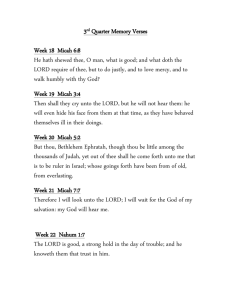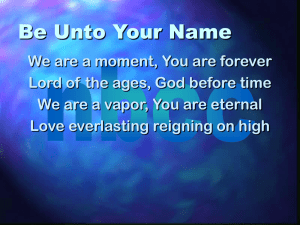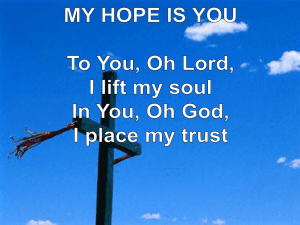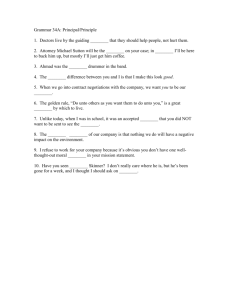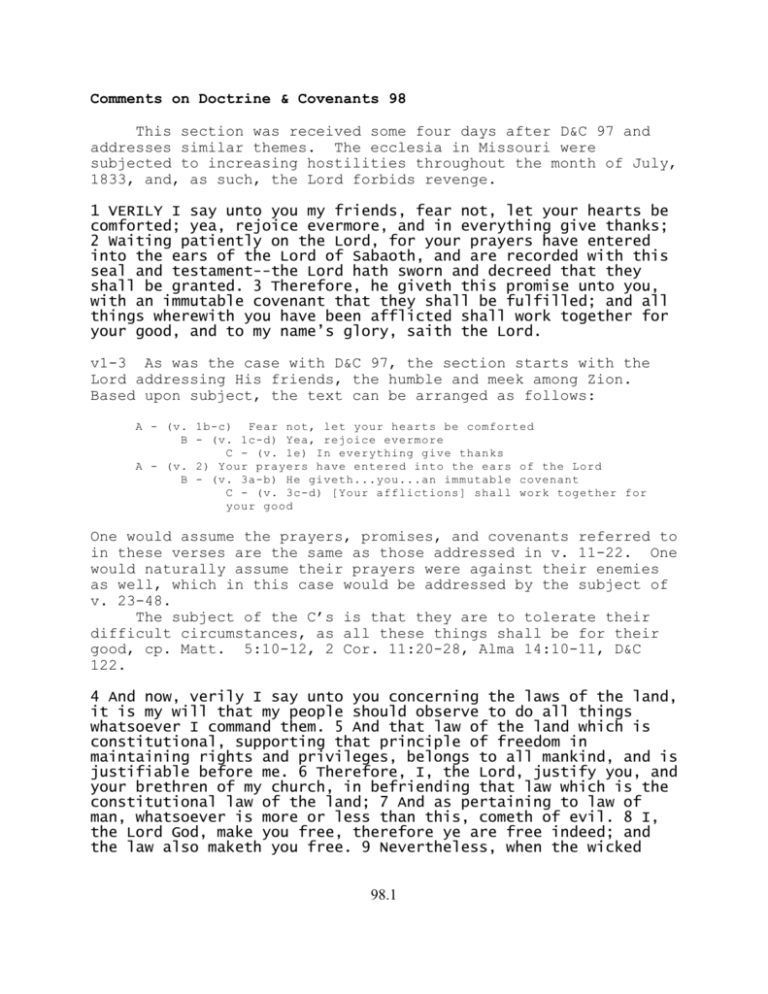
Comments on Doctrine & Covenants 98
This section was received some four days after D&C 97 and
addresses similar themes. The ecclesia in Missouri were
subjected to increasing hostilities throughout the month of July,
1833, and, as such, the Lord forbids revenge.
1 VERILY I say unto you my friends, fear not, let your hearts be
comforted; yea, rejoice evermore, and in everything give thanks;
2 Waiting patiently on the Lord, for your prayers have entered
into the ears of the Lord of Sabaoth, and are recorded with this
seal and testament--the Lord hath sworn and decreed that they
shall be granted. 3 Therefore, he giveth this promise unto you,
with an immutable covenant that they shall be fulfilled; and all
things wherewith you have been afflicted shall work together for
your good, and to my name’s glory, saith the Lord.
v1-3 As was the case with D&C 97, the section starts with the
Lord addressing His friends, the humble and meek among Zion.
Based upon subject, the text can be arranged as follows:
A - (v. 1b-c) Fear not, let your hearts be comforted
B - (v. 1c-d) Yea, rejoice evermore
C - (v. 1e) In everything give thanks
A - (v. 2) Your prayers have entered into the ears of the Lord
B - (v. 3a-b) He giveth...you...an immutable covenant
C - (v. 3c-d) [Your afflictions] shall work together for
your good
One would assume the prayers, promises, and covenants referred to
in these verses are the same as those addressed in v. 11-22. One
would naturally assume their prayers were against their enemies
as well, which in this case would be addressed by the subject of
v. 23-48.
The subject of the C’s is that they are to tolerate their
difficult circumstances, as all these things shall be for their
good, cp. Matt. 5:10-12, 2 Cor. 11:20-28, Alma 14:10-11, D&C
122.
4 And now, verily I say unto you concerning the laws of the land,
it is my will that my people should observe to do all things
whatsoever I command them. 5 And that law of the land which is
constitutional, supporting that principle of freedom in
maintaining rights and privileges, belongs to all mankind, and is
justifiable before me. 6 Therefore, I, the Lord, justify you, and
your brethren of my church, in befriending that law which is the
constitutional law of the land; 7 And as pertaining to law of
man, whatsoever is more or less than this, cometh of evil. 8 I,
the Lord God, make you free, therefore ye are free indeed; and
the law also maketh you free. 9 Nevertheless, when the wicked
98.1
rule the people mourn. 10 Wherefore, honest men and wise men
should be sought for diligently, and good men and wise men ye
should observe to uphold; otherwise whatsoever is less than these
cometh of evil.
v4-10 These verses instruct the Church to uphold the
constitutional form of government, as it makes them free. Verse
9 in particular states the problem is not the form of government,
but the people chosen to represent and enforce its laws, cp.
Mosiah 29:17.
Given the abuse of government power, it would have been a
natural reaction for them to become hostile to the form as well
as the administrators of the government. The Lord’s admonition
encourages them to recognize the constitution makes them free,
and they should endeavor to support honest and wise men as
leaders so they may enjoy those freedoms.
11 And I give unto you a commandment, that ye shall forsake all
evil and cleave unto all good, that ye shall live by every word
which proceedeth forth out of the mouth of God. 12 For he will
give unto the faithful line upon line, precept upon precept; and
I will try you and prove you herewith.
13 And whoso layeth down his life in my cause, for my name’s
sake, shall find it again, even life eternal. 14 Therefore, be
not afraid of your enemies, for I have decreed in my heart, saith
the Lord, that I will prove you in all things, whether you will
abide in my covenant, even unto death, that you may be found
worthy. 15 For if ye will not abide in my covenant ye are not
worthy of me.
16 Therefore, renounce war and proclaim peace, and seek
diligently to turn the hearts of the children to their fathers,
and the hearts of the fathers to the children; 17 And again, the
hearts of the Jews unto the prophets, and the prophets unto the
Jews; lest I come and smite the whole earth with a curse, and all
flesh be consumed before me.
18 Let not your hearts be troubled; for in my Father’s house
are many mansions, and I have prepared a place for you; and where
my Father and I am, there ye shall be also.
19 Behold, I, the Lord, am not well pleased with many who
are in the church at Kirtland; 20 For they do not forsake their
sins, and their wicked ways, the pride of their hearts, and their
covetousness, and all their detestable things, and observe the
words of wisdom and eternal life which I have given unto them. 21
Verily I say unto you, that I, the Lord, will chasten them and
will do whatsoever I list, if they do not repent and observe all
things whatsoever I have said unto them. 22 And again I say unto
you, if ye observe to do whatsoever I command you, I, the Lord,
will turn away all wrath and indignation from you, and the gates
of hell shall not prevail against you.
98.2
v11-22 The subject returns to matters of primarily religion,
however these verses weave together both physical and spiritual
matters. Their difficult circumstances and poor treatment were
very much physical, and a result of their failure to keep the
commandments. The result is their faith and spirituality was
being tested by their physical circumstances. This is standard
OT covenant theology: bad spiritual circumstances lead to bad
physical circumstances, good spiritual circumstances lead to good
physical circumstances.
The text can be arranged as follows:
A - (v. 11-12) Forsake all evil...live by every word...of God
B - (v. 13-15) I will prove you in all things, abide My covenant
C - (v. 16) Renounce war...turn hearts of father to children
C - (v. 17) Lest all flesh consumed, turn hearts of Jews to
prophets
B - (v. 18) I have prepared a place for you, with My Father and I
A - (v. 19-22) They do not forsake evil...[or] observe words of wisdom
v11-12 The Lord instructs them to keep His commandments. Had
they been observing His teachings all along He would have been
blessing them with peace and protection from their enemies, cf.
D&C 97:18-19. Instead, they have ignored them, and as a result
fallen prey to their enemies. The result is the Lord is testing
and trying them.
v13-15 Regardless of the difficult circumstances they find
themselves in, a result of failure at a corporate level to keep
the Lord’s commands, the Lord admonishes His friends, the humble
and meek among Zion, to be faithful so they may be proven in all
things and ultimately found worthy of eternal life. This
necessarily moves the subject from corporate to individual
covenant keeping.
v16-17 A paraphrase of Mal. 4:6 which forwards a physical
interpretation, contrast this with the spiritual usage of the
same passage in D&C 2:2. The Saints are instructed to seek for
peace rather than retribution. While v. 16 is blatantly physical
given the context, v. 17 presents another more spiritual reading
encouraging them to maintain their duties as the ecclesia and
seek to redeem Israel, rather than become completely sidetracked
by the intrigue around them.
v16 “proclaim peace” cp. v. 34-35.
v18 This verse compliments v. 13-15 by informing them the Lord
has prepared a place for them with Him in His Father’s mansion.
98.3
v19-22 The Lord chastises the Saints at Kirtland, apparently as
a negative example to those in Missouri, for failing to keep the
principles outlined in v. 11-12, and they will be chastened until
they repent, cp. Lev. 26:14, 21, 23, 27. Then v. 22 closes off
with the statement that if they would do what the Lord commanded
He would turn away both physical and spiritual torment from them,
thus again uniting the subjects of their spiritual and physical
circumstances.
While the Lord is primarily addressing the situation in
Missouri, He also makes it clear to those in Kirtland they are
held to the same standard.
23 Now, I speak unto you concerning your families--if men will
smite you, or your families, once, and ye bear it patiently and
revile not against them, neither seek revenge, ye shall be
rewarded; 24 But if ye bear it not patiently, it shall be
accounted unto you as being meted out as a just measure unto you.
25 And again, if your enemy shall smite you the second time, and
you revile not against your enemy, and bear it patiently, your
reward shall be an hundredfold. 26 And again, if he shall smite
you the third time, and ye bear it patiently, your reward shall
be doubled unto you four-fold; 27 And these three testimonies
shall stand against your enemy if he repent not, and shall not be
blotted out. 28 And now, verily I say unto you, if that enemy
shall escape my vengeance, that he be not brought into judgment
before me, then ye shall see to it that ye warn him in my name,
that he come no more upon you, neither upon your family, even
your children’s children unto the third and fourth generation. 29
And then, if he shall come upon you or your children, or your
children’s children unto the third and fourth generation, I have
delivered thine enemy into thine hands; 30 And then if thou wilt
spare him, thou shalt be rewarded for thy righteousness; and also
thy children and thy children’s children unto the third and
fourth generation. 31 Nevertheless, thine enemy is in thine
hands; and if thou rewardest him according to his works thou art
justified; if he has sought thy life, and thy life is endangered
by him, thine enemy is in thine hands and thou art justified.
32 Behold, this is the law I gave unto my servant Nephi, and
thy fathers, Joseph, and Jacob, and Isaac, and Abraham, and all
mine ancient prophets and apostles. 33 And again, this is the law
that I gave unto mine ancients, that they should not go out unto
battle against any nation, kindred, tongue, or people, save I,
the Lord, commanded them. 34 And if any nation, tongue, or people
should proclaim war against them, they should first lift a
standard of peace unto that people, nation, or tongue; 35 And if
that people did not accept the offering of peace, neither the
second nor the third time, they should bring these testimonies
before the Lord; 36 Then I, the Lord, would give unto them a
commandment, and justify them in going out to battle against that
nation, tongue, or people. 37 And I, the Lord, would fight their
98.4
battles, and their children’s battles, and their children’s
children’s, until they had avenged themselves on all their
enemies, to the third and fourth generation. 38 Behold, this is
an ensample unto all people, saith the Lord your God, for
justification before me.
39 And again, verily I say unto you, if after thine enemy
has come upon thee the first time, he repent and come unto thee
praying thy forgiveness, thou shalt forgive him, and shalt hold
it no more as a testimony against thine enemy-- 40 And so on unto
the second and third time; and as oft as thine enemy repenteth of
the trespass wherewith he has trespassed against thee, thou shalt
forgive him, until seventy times seven. 41 And if he trespass
against thee and repent not the first time, nevertheless thou
shalt forgive him. 42 And if he trespass against thee the second
time, and repent not, nevertheless thou shalt forgive him. 43 And
if he trespass against thee the third time, and repent not, thou
shalt also forgive him. 44 But if he trespass against thee the
fourth time thou shalt not forgive him, but shalt bring these
testimonies before the Lord; and they shall not be blotted out
until he repent and reward thee four-fold in all things wherewith
he has trespassed against thee. 45 And if he do this, thou shalt
forgive him with all thine heart; and if he do not this, I, the
Lord, will avenge thee of thine enemy an hundred-fold; 46 And
upon his children, and upon his children’s children of all them
that hate me, unto the third and fourth generation. 47 But if the
children shall repent, or the children’s children, and turn to
the Lord their God, with all their hearts and with all their
might, mind, and strength, and restore four-fold for all their
trespasses wherewith they have trespassed, or wherewith their
fathers have trespassed, or their fathers’ fathers, then thine
indignation shall be turned away; 48 And vengeance shall no more
come upon them, saith the Lord thy God, and their trespasses
shall never be brought any more as a testimony before the Lord
against them. Amen.
v23-48
Laws concerning how to deal with physical oppressors.
v23-31 We are to tolerate three offenses at the hands of our
enemies, and if we do so then the Lord will consider us justified
and bless us (v. 23-26). Failure to do so results in the Lord
considering us getting what we deserve (v. 24). The three
incidents we do tolerate stand as a witness against our
oppressors (v. 27), per the Law that requires two or three
witnesses to put someone to death (cf. Deut 17:6). Given these
three incidents, if the Lord has not already destroyed them
Himself, we are to warn our enemy in the name of the Lord they
are to no more come against us (v. 28-29). In this case, if we
choose to spare them, we will be blessed (v. 30). Nevertheless,
if we choose to destroy them, we are justified (v. 31).
98.5
v28 “unto the third and fourth generation”, referring to the
grandchildren and great-grandchildren of those who are currently
their enemies. As long as the hatred of their enemies is brought
to bear on subsequent generations, such that they remain hostile
(cp. Mosiah 10:17), the Law of three offenses is in force.
The plain definition given here serves to explicitly explain
the meaning of the phrase, as it appears undefined in Exod. 20:5,
Exod. 34:7. Num. 14:18, Deut. 5:9 and various OT Prophets.
v32-38 A recounting
23-31. This Law was
applied properly the
(v. 36-37). Compare
of history behind the Law just given in v.
dispensed anciently (v. 32-35), and when
Lord would then go and fight their battles
Exod. 17:8-16.
v32 That this Law was given to Abraham, Isaac, and Jacob
indicates it predated the Law of Moses. The verse also states it
was given to Nephi as well. We would assume this is in reference
to the wars between the Nephites and Lamanites subsequent to
their division, cf. 2 Ne. 5.
v34
Compare Deut. 20:10-12.
v39-48 The Law concerning the repentance of enemies. As often
as the enemy repents we are required to forgive, and doing so
results in the offense not being allowed to be used as one of the
three testimonies against them (v. 39-40). Regardless of whether
or not the enemy repents, we are required to forgive them for
three unrepented offenses (v. 41-43). With the fourth unrepented
for offense, we are justified in not forgiving them and the Lord
becomes our avenger for as many generations hate the Lord’s
people, and therefore Him (v. 44-46). However, if the children
of the enemies repent and make reparations, then we are to
forgive them and the previous three offenses held against them
are absolved (v. 47-48).
98.6
Historical Material Pertaining to Doctrine & Covenants 98
The situation in Missouri began deteriorating in July, 1833
with the locals being incensed over seemingly anti-slavery
comments published in the Evening and Morning Star. On July 23rd
an armed mob of hundreds of locals enter Independence, whereupon
the leaders of the Church state they will move out of the county
by January 1, 1834, and publication of Evening and Morning Star
ceases. In light of the hostilities, the Lord forbids revenge.
The first two excerpts are first-hand witness accounts of
the events in Missouri, recounted by Parley P. Pratt.
The third excerpt discusses a tragic speech by Sidney Rigdon
wherein he directly contradicted the counsel of D&C 98.
Excerpt from Autobiography of Parley Parker Pratt
This revelation [i.e., D&C 97] was not complied with by the
leaders and Church in Missouri, as a whole; notwithstanding many
were humble and faithful. Therefore, the threatened judgment was
poured out to the uttermost, as the history of the five following
years will show.
That portion of the inhabitants of Jackson County which did
not belong to the Church, became jealous of our growing influence
and numbers. Political demagogues were afraid we should rule the
county; and religious priests and bigots felt that we were
powerful rivals, and about to excel all other societies in the
State in numbers, and in power and influence.
These feelings, and the false statements and influences
growing out of them, gave rise to the organization of a company
of outlaws, whose avowed object was to drive the Church of the
Saints from the county.
These were composed of lawyers, magistrates, county
officers, civil and military; religious ministers, and great
numbers of the ignorant and uninformed portion of the population,
whose prejudices were easily aroused. (Parley P. Pratt,
Autobiography of Parley Parker Pratt, pages 77-78)
Excerpt from History of the Late Persecution
But to proceed with my history. Pursuant to the last clause
of the bond, the mob met at the court house, on the 20th of July,
and proceeded immediately to demolish the brick printing office
and dwelling house of W.W. Phelps & Co., and destroyed or took
possession of the press, type, books and property of the
establishment; at the same time turning Mrs. Phelps and children
out of doors, after which they proceeded to personal violence by
a wanton assault and battery upon the bishop of the Church, Mr.
Edward Partridge, and a Mr. Allen, whom they tarred and
98.7
feathered, and variously abused. They then compelled Messrs.
Gilbert, Whitney & Co. to close their store and pack their goods,
after which they adjourned to meet again on the 23rd of July; on
which day they again met, to the number of several hundred, armed
with fire-arms, dirks and sticks, with red flags hoisted, and as
they entered town, threatening death and destruction to the
Mormons. On this day, six individuals of the Church signed an
agreement to leave the county, one half by the first of January,
and the other half by the first of April, 1834; hoping thereby to
preserve the lives of their brethren, and their property. After
this the mob dispersed, threatening destruction to the Mormons on
the next New Year’s Day if they were not off by that time.
After this, an express was sent to the governor of the
state, stating the facts of the outrages, and praying for some
relief and protection. But none was afforded, only some advice
for us to prosecute the offenders, which was accordingly
undertaken. But this so enraged the mob that they began to make
preparations to come out by night and recommence depredations.
Having passed through the most aggravating insults and injuries
without making the least resistance, a general inquiry prevailed
at this time throughout the Church, as to the propriety of
self-defense. Some claimed the right of defending themselves,
their families and property, from destruction; while others
doubted the propriety of self-defense; and as the agreement of
the 23rd of July, between the two parties had been published to
the world, wherein it was set forth, that the Mormons were not to
leave until the 1st of January and 1st of April, 1834. It was
believed by many of the Mormons that the leaders of the mob would
not suffer so bare-faced a violation of the agreement before the
time therein set forth; but Thursday night, the 31st of October,
gave them abundant proof that no pledge, verbal or written, was
longer to be regarded; for, on that night, between forty and
fifty, many of whom were armed with guns, proceeded against a
branch of the Church, about eight miles west of town, and
unroofed and partly demolished ten dwelling houses; and in the
midst of the shrieks and screams of women and children, whipped
and beaten in a savage manner, several of the men; and with their
horrid threats, frightened women and children into the
wilderness. Such of the men as could escape, fled for their
lives; for very few of them had arms, neither were they embodied;
and they were threatened with death if they made any resistance.
Such, therefore, as could not escape by flight, received a
pelting by rocks, and a beating by guns and whips.
On Friday, the first of November, women and children sallied
forth from their gloomy retreats, to contemplate, with
heart-rending anguish, the ravages of a ruthless mob, in the
mangled bodies of their husbands, and in the destruction of their
houses and furniture. Houseless, and unprotected by the arm of
98.8
civil law in Jackson County- -the dreary month of November
staring them in the face, and loudly proclaiming a more inclement
season at hand--the continual threats of the mob, that they would
drive every Mormon from the county--and the inability of many to
remove because of their poverty, caused an anguish of heart
indescribable.
These outrages were committed about two miles from my
residence; news reached me before daylight the same morning, and
I immediately repaired to the place, and was filled with anguish
at the awful sight of houses in ruins, and furniture destroyed
and strewed about the streets; women, in different directions,
were weeping and mourning, while some of the men were covered
with blood from the blows they had received from the enemy;
others were endeavoring to collect the fragments of their
scattered furniture, beds, etc.
I endeavored to collect together as many men as possible,
and after consultation, we concluded to embody for defense.
Accordingly we collected some sixty men, armed ourselves as well
as we could, and took shelter the next evening in a log house. We
set a guard, and sent out spies through the different parts of
the settlement to watch the movements of the mob; but sometime in
the night two of the enemy advanced to our guard, being armed
with guns and pistols, and while they were conversing I walked
near them, and one of them struck me over the head, with all his
might, with his gun. I staggered back, the blood streaming down
my face, but I did not fall. As I had command of our party, I
ordered our men to disarm the two ruffians and secure them, which
was done; and this probably prevented a general attack of the mob
that night. The next morning they were let go in peace.
The same night (Friday) a party in Independence commenced
stoning houses, breaking down doors and windows, destroying
furniture, etc. This night the brick part of a dwelling house
belonging to A.S. Gilbert, [Algernon Sidney] was partly
demolished, and the windows of his dwelling broken in, while a
gentleman lay sick in his house.
The same night the doors of the house of Messrs. Gilbert and
Whitney were split open, and the goods strewed in the street, to
which fact upwards of twenty witnesses can attest.
After midnight a party of our men marched for the store,
etc. and when the mob saw them approach they fled. But one of
their number, a Richard McCarty, was caught in the act of
throwing rocks in at the door, while the goods lay strung around
him in the street. He was immediately taken before Samuel Weston,
Esq. and a warrant requested, that said McCarty might be secured;
but his justiceship refused to do anything in the case, and
McCarty was then liberated.
The same night many of their houses had poles and rails
thrust through the shutters and sash, into the rooms of
98.9
defenseless women and children, from whence their husbands and
fathers had been driven by the acts of the mob which were made by
ten or twenty men upon one house at a time. On Saturday, the 2nd
of November, all the families of these people who lived in
Independence, moved out of town about one half mile west, and
embodied for the preservation of themselves and property.
Saturday night a party of the mob made an attack upon a
settlement about six miles west of town. Here they tore the roof
from a dwelling, broke open another house, found the owner, Mr.
David Bennett, sick in bed; him they beat inhumanly, and swore
they would blow his brains out, and discharging a pistol, the
ball cut a deep gash across the top of his head. In this skirmish
one of their men was shot in the thigh. (Parley P. Pratt, History
of the Late Persecution Inflicted by the State of Missouri Upon
the Mormons, pages 11-15)
Excerpt from The Story of the Latter-day Saints
Independence Day, July 4, 1838, was crucial. At Far West the
Saints celebrated the national holiday and laid the cornerstones
of a temple. Orator for the day was Sidney Rigdon, who, despite
recent illness, maintained the ability to whip feelings into high
emotion. His speech, approved by Joseph Smith and other Church
leaders, was a declaration of independence for the Saints from
any further mob violence or illegal activity. He concluded his
long and stinging oration with words that must have sunk deep
into the heart of every listener:
We take God and all the holy angels to witness
this day, that we warn all men in the name of Jesus
Christ, to come on us no more forever, for from this
hour, we will bear it no more, our rights shall no more
be trampled on with impunity. The man or the set of
men, who attempts it, does it at the expense of their
lives. And that mob that comes on us to disturb us; it
shall be between us and them a war of extermination;
for we will follow them, till the last drop of their
blood is spilled, or else they will have to exterminate
us: for we will carry the seat of war to their own
houses, and their own families, and one party or the
other shall be utterly destroyed.—Remember it then all
MEN.
We will never be the aggressors, we will infringe
on the rights of no people; but shall stand for our own
until death. We claim our own rights, and are willing
that all others shall enjoy theirs.
No man shall be at liberty to come into our
streets, to threaten us with mobs, for if he does, he
98.10
shall atone for it before he leaves the place, neither
shall he be at liberty, to vilify and slander any of
us, for suffer it we will not in this place.
We therefore, take all men to record this day,
that we proclaim our liberty this day, as did our
fathers. And we pledge this day to one another, our
fortunes, our lives, and our sacred honors, to be
delivered from the persecutions which we have had to
endure, for the last nine years, or nearly that.
Neither will we indulge any man, or set of men, in
instituting vexatious law suits against us, to cheat us
out of our just rights, if they attempt it we say wo
unto them.
We this day then proclaim ourselves free, with a
purpose and a determination, that never can be broken,
“no never! no never!! NO NEVER”!!!
The jubilant audience responded: “Hosannah, hosannah, hosannah!
Amen. Amen. Amen!” and repeated it three times.
Much of Rigdon’s oration was obviously heated rhetoric, but
it represented the determination of the Saints to fight back.
When distorted reports reached the mobs and other Missouri
citizens, however, it provided a basis for charges of treason and
violence against the Saints that were fostered by those who
wanted to drive them from the state. (James B. Allen and Glen M.
Leonard, The Story of the Latter-day Saints, page 133)
Copyright © 2013 by S. Kurt Neumiller <kurt.neumiller@gmail.com>.
All rights reserved. No part of this text may be reproduced in
any form or by any means for commercial gain without the express
written consent of the author. Digital or printed copies may be
freely made and distributed for personal and public
non-commercial use.
98.11





